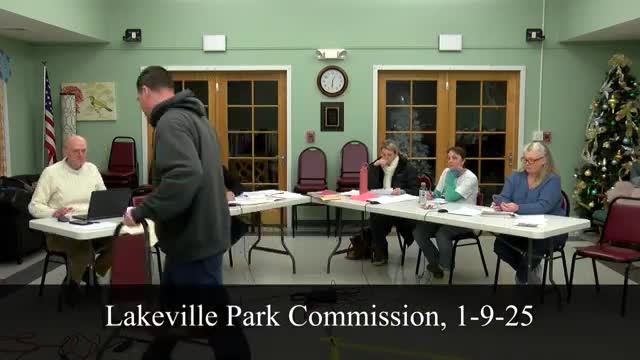Applicant proposes returning Lakeville haunted house at Ted Williams Camp; commissioners press limits on trees, parking and conservation
Get AI-powered insights, summaries, and transcripts
Subscribe
Summary
Joe Dishaw pitched a large fall haunted-house and carnival plan for Ted Williams Camp, proposing permanent-style animatronic shelters, new wiring and cleared parking areas. Park commissioners said they will not approve tree removal and flagged conservation, permitting and electric-permit hurdles.
Joe Dishaw, who said he previously ran a haunted-house attraction for 18 years, presented a proposal Jan. 9 to reestablish a large-scale haunted-house and carnival at Ted Williams Camp in Lakeville.
Dishaw told the Lakeville Park Commission he envisions 10-by-10 structures for weather-protected animatronics, a trailer-based ticket booth, carnival rides from Rockwell Amusements and food and vendor areas. “The 10 by 10 structures would be to house my $5,000 animatronics. Those have to be in a weather type building,” Dishaw said, describing computerized figures that run on compressors. He proposed operating Thursday through Sunday across October, with the possibility of adding late-September dates. Dishaw also said he would contract a licensed master electrician to install a new 200-amp service and light poles, and estimated pulling that electrical work could cost “close to $10,000.”
Commissioners and staff pressed Dishaw on site constraints. Park Commissioner Brenda (last name not specified in the transcript), who identified herself as on the select board, said the commission will not permit tree removal. “I myself will not allow 1 tree to come down for an event,” she said, adding that the parks have “worked too hard” to preserve trees and trails. Commissioners noted the property includes conservation-restricted areas and wetlands maps that limit where permanent or semi-permanent alterations can occur.
Commission members asked about parking and crowd control. Dishaw said he had sketched potential parking areas and suggested clearing a small section of trees to add spaces, but commissioners responded that portions of the park are planned for other municipal uses — including a future fire station — and that existing lots and access must be used where possible. Commissioners and staff also cautioned Dishaw he must obtain building permits, electrical permits and conservation approvals and said any underground conduit or new poles would require review by the building inspector and project manager.
On structures and staging, commissioners noted state building-code distinctions discussed during the meeting: wood-floor display buildings are often treated as portable, while slab-on-grade construction is normally considered permanent. Dishaw said he planned some display structures with dirt floors and separate weather-tight buildings for the animatronics and that he had carried a $5 million liability policy in a prior operation; he told commissioners he would renew insurance before staging operations. He also said he planned to hire police details for crowd control.
Commissioners directed Dishaw to work with park staff and the town project manager and conservation officials, and to secure all required permits before the commission would consider a formal application. Staff indicated Peter (last name not in the transcript) would follow up with Dishaw. Dishaw said he would return with further plans by the next commission meeting.
Why it matters: The proposal would bring significant visitor traffic and revenue to town parks but also raises conservation and operational questions — including how to provide safe parking and lighting and whether temporary attractions can be hosted without altering protected park lands. The commission emphasized that any use of the property must preserve trees and trails and comply with town permitting and conservation rules.
What’s next: Dishaw was told to consult with the project manager and building inspection, and commissioners said staff would follow up on the feasibility and permit pathway.
